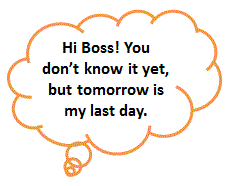How You Quit Matters
 When leaving a job, we all know it is best to part on good terms. You know…don’t burn any bridges. HOW you quit will stay in people’s memories long after you’re gone.
When leaving a job, we all know it is best to part on good terms. You know…don’t burn any bridges. HOW you quit will stay in people’s memories long after you’re gone.
I recommend that people set an objective for how they want to quit and be clear why it benefits them.
For example:
- Leave with a solid reputation – because it provides source of positive referrals for future companies, or the possibility of returning to your former employer.
- Exit with all of the compensation you’re entitled to – because waiting until your stock or 401K vests, or for a bonus, provides money that you may need or help cushion you through a transition.
- Quit as soon as you’ve mastered a skill, or launched a successful program – because leaving while you’re confident and proud of your work is the ideal attitude to have while launching into your next phase.
Having an objective for the way that you want to leave your job gives you something to hold onto when you’re having a particularly bad day. It is a reminder of why you aren’t storming out of the office – you’re determined to quit on your terms.
I have to note, though, that I interviewed people who reached a breaking point at work and quit suddenly. After being yelled at in front of his coworkers, one customer service representative told his supervisor that, “I will no longer allow you to treat me this way. I quit.”
Another woman I spoke with was so miserable that she couldn’t take one more day of work. She went into work, got a few things from her office, and told her manager on the way out, “I’m quitting today.”
While it is prudent to leave on good terms, the people I spoke with had no problem finding other jobs. They had felt crushed by their old jobs and standing up for themselves was a way of taking their power back. It reminded them that in fact, nobody had the right to treat them abusively.
And then there’s Marina Shifrin, who became famous for her dance video resignation letter.

Recent Comments